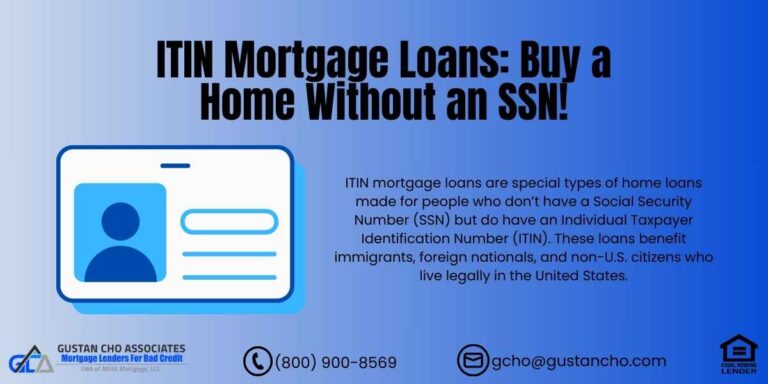How to Get a Self-Employed Mortgage
This guide covers how to get a self-employed mortgage. Non-QM loans, such as the bank statement loans for self-employed mortgage borrowers, are back. Self-employed mortgage borrowers had a very hard time getting qualified for home loans after the subprime crisis of 2008 due to the restructuring of the mortgage industry. The American dream is to own your own business. The true American dream is to be both a business owner and a homeowner. Self-employed mortgage borrowers can now qualify for a home loan with our new Bank Statement Mortgage Loan Program at Mortgage Lenders for Bad Credit. Many successful business owners had a difficult time obtaining a home loan until now due to it being difficult for lenders to approve a mortgage for a self-employed homebuyer. However, many business owners who had a difficult time obtaining a mortgage loan for self-employed home buyers can now qualify. John Strange, a senior mortgage loan originator at Mortgage Lenders for Bad Credit, says the following about self-employed mortgage loans:
Until now, getting qualified for a mortgage loan for self-employed home buyer was difficult for most business owners This was due to them claiming write-offs on business and personal tax returns where they reflect little to no positive income.
Writing off expenses is a great tool for business owners but until now was a great obstacle in getting qualified for home loans. Business write-offs save the business owner thousands of dollars. But until now, business owners had to pay the price when it came to qualifying for a residential mortgage loan. In this article, we will discuss and cover self-employed mortgage loans with no income tax returns.
Self-Employed Mortgage: Everything You Need To Know
Challenges of Verifying Self-Employment Income
Main Document Obligations
- Two (2) years of self-employment income.
- Holistic tax filings herewith (individual alongside business).
- Profit and Loss (P&L) statements.
- Attested evidence of business.
- Current year’s income.
- Statements from business bank accounts.
Get the Mortgage You Deserve as a Self-Employed Borrower
Apply Now And Get recommendations From Loan Experts
Various Methods Of Calculating Income
Standard Calculation Methods
Adjusted Gross Income Method
- It relies on the net income garnered from tax return documents.
- Average income over the past two years.
- Most common verification approach
Bank Statement Loan Program
- Business or personal bank statements spanning 12 to 24 months.
- Averaging monthly deposits made over the frame.
- It’s much better for a very new self-employed individual.
- Higher-than-average interest rates tend
Verification of Profit and Loss Statements
- Systematic breakdown of constituents of income.
- Must be certified by a chartered public accountant (CPA).
- Must specify revenue (accounted income), expenses (incurred), and net profit.
Available Loan Programs
Required Criteria for Obtaining Conventional Loans
- Must have a minimum of two years of self-employment.
- Increasing or consistent income is favored.
- Consistently below 43% DTI ratios on debts.
- 620 and above credit score.
- Usually, it requires a 10 to 20 percent deposit.
Benefits of FHA Loans
- The documents required are more lenient.
- Accepts poorer credit scores than conventional ones.
- Maybe approved if they have been self-employed for 1 year.
- Must have strong compensating factors
Alternatives Non-QM Loans
- Loans are given based on bank statements.
- Loans based on asset depletions.
- Stated income loans.
- Higher interest rates.
- Less stringent underwriting guidelines.
Critical Documentation Required
Detailed Document Checklist
- Federal tax return forms (both personal and business).
- Schedule C tax forms.
- 1099 tax form.
- Profit and Loss Statement.
- Business Tax Return.
- Business bank account statements.
- Valid business license.
- Professional licenses.
- Client contracts/invoices.
- CPA’s letter attesting the business viability
Business Stability
- Evaluation criteria by the lender.
- Stable or increasing income.
- Variety of customers.
- At least 2 years of self-employed work experience.
Business Education
- Industry work experience.
- Available savings.
- Payment history.
Qualifying Income Inclusions
Determinants of income
Last two Years’ Average
- Most lenders view it as the most conservative approach.
- Provides a reasonable smoothing out of income.
- Allows for a lumpy income.
Current projection year/That was filled out in the future before
- This method assumes the present year will result in a marked earnings improvement.
- It will be scrutinized and may require a lot of paperwork.
- They may be subjected to guides that set contracts.
- Credit and Financial Preparation
Optimization Strategies
- It should be kept above 700.
- Pay off any debt beforehand.
- Prudently save money set aside solely for business purposes.
- Avoid cutting the value of claimed income using tax write-offs until the application is made for the business mortgage.
Challenges To Anticipate
Typical Issues Faced By Self-Employed Individuals
- Fluctuating income
- Complicated tax scenarios
- Absence of standard employment proof
- Increased risk perception from financial institutions.
- Possible Manual Underwriting
Recommended Preparatory Actions:
A Year-Long Plan Breakdown
- Collect all relevant financial documentation.
- Pay off debt, both personal and business-related.
- Save for emergencies.
- Ensure a steady cash flow.
- Collaborate with a CPA for tax return optimization.
- Improve and maintain credit score.
- Refrain from business or personal expenses.
- Commence compiling income documentation.
Tips When Applying For Loans
Comprehensive Plan
- Use a self-employed lending mortgage broker.
- Secure a pre-approval before shopping for homes.
- Be willing to present income that is double the industry standard.
- Relook at non-QM options when facing difficulties with conventional approaches.
- Justify business stability and potential for growth.
Being self-employed doesn’t mean you can’t qualify for a mortgage
Apply Now And Get recommendations From Loan Experts
Specialized Loan Programs For Other Industries
Other Sector-Based Tools
- Professional loans geared towards professionals.
- Business owner startup incentives.
- Financing for people in the creative fields.
- Mortgage plans for tech entrepreneurs.
Special Notes For Tech Experts In The Industry
Additional Features for Tech Employees
- Document income with stock options.
- Equity from startups.
- Contract job assessment.
- Remote work income verification.
Self-employed, each underwriter has a unique story. Regardless of the situation you are prepared for, the right mortgage makes the process much simpler.
How Lenders Underwrite Self-Employed Mortgage Loans
Mortgage lenders care about two things when it comes to granting a mortgage loan approval for a home buyer. The first factor lenders will look at when underwriting a home loan is the borrower’s credit and credit scores. The second factor, and more important than credit, is the borrower’s qualified monthly income. There are minimum down payment requirements. Angie Torres, the National Operations Director at Mortgage Lenders for Bad Credit, says the following about self-employed mortgage loans:
In general, lenders will thoroughly review income history for the past two years via W-2s, tax returns, and most recent paycheck stubs. The days of stated income or no-doc loans were dormant after the 2008 real estate and credit meltdown but are now back in full swing.
Homebuyers who were either hourly wagers or salaried employees had no problem verifying gross income. However, business owners and self-employed individuals had a difficult time obtaining a mortgage loan due to lenders going off adjusted gross income on their tax returns. Most self-employed individuals write off as much as they legally can write off on their tax returns so they can minimize their gross income. This was always a problem when underwriting a home loan for a self-employed home buyer. Again, bank statement loans are back, and we now offer self-employed mortgage loans for self-employed homebuyers.
12-Month And 24-Month Bank Statement Loan Programs For Self-Employed Mortgage
The issue before the emergence of the bank statement mortgage loan programs was that mortgage lenders only went by the business owner borrower’s tax returns, and every lender interprets tax returns differently. Some lenders will allow certain deductions to be added back to income for mortgage qualification purposes. For real estate investors, depreciation can be added back to income as well as other real estate deductions.
With our bank statement mortgage loan program, we go off the deposits each month on bank statements. We like to see 24 months of bank statements. But we also have 12-month bank statement mortgage loan programs.
A down payment on a home purchase with our bank statement mortgage loan programs requires a 15% down payment on a home purchase. There is no loan limit with our bank statement mortgage loans. No income tax returns required. 10% to 20% down payment required. Down payment depends on borrowers credit scores. Mortgage rates depend on down payment and borrowers credit scores. Homebuyers who are interested in knowing more about our mortgage program for self-employed home buyers, please contact us at Mortgage Lenders for Bad Credit at 800-900-8569 or text us for a faster response. Or email us at gcho@gustancho.com.
Why Choose a Self-Employed Mortgage?
Apply Now And Get recommendations From Loan Experts







